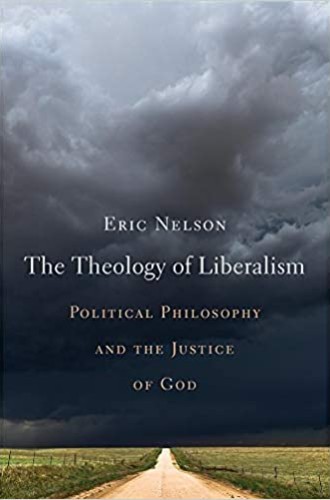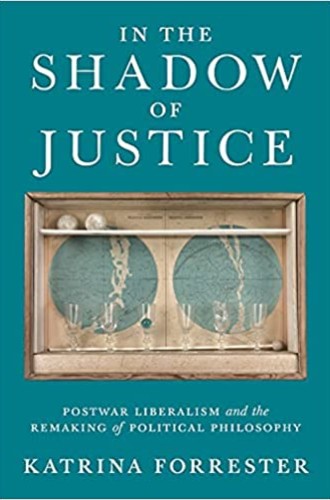Can John Rawls help Christians understand justice?
Two new monographs provide religious entry points into the political philosopher’s thought.
Theologians care about justice. So do philosophers. But they don’t talk to each other about it very much. Harvard professors Eric Nelson and Katrina Forrester offer pathways to bridge this gap—each in conversation with a philosopher who changed the course of political theory, John Rawls (1921–2002).
Rawls’s landmark 1971 book, A Theory of Justice, introduced a fundamentally new set of questions to political theory. Try to imagine, he suggested, building the basic framework for laws and policies behind a “veil of ignorance” about our own individual circumstances—financier or farmer, teacher or trashman, specialist in law or in laundry. Unable to seek personal advantage, we would want to know the worst that might happen to us. Would the policies we set benefit the worst-off people or just trade some people’s gains for others’ losses? Should we give up personal and political liberties for other things we want? How could our institutions reward hard work while protecting the most vulnerable?
Read our latest issue or browse back issues.
In these imaginary circumstances, Rawls argued, we would agree on two principles of justice. First, basic liberties are inviolable, never to be traded off for other benefits. Second, inequality of wealth must be constrained in order to maximize the welfare of those who are at the bottom of the heap. Ignorant of where each of us would end up, this is what we would choose. Therefore this is what justice requires.
Borrowing the notion of a social contract from early modern theorists like Hobbes and Locke and infusing it with elements of Kant’s insistence on moral autonomy, Rawls offered the most influential challenge in a century to the reign of utilitarian, Marxist, and laissez-faire economic theories. Although he adjusted and elaborated his theory many times in later articles and books, he never renounced his conviction that the key to just institutions is asking not who gets what but how all can benefit.
Nelson and Forrester each reflect awareness of a half century of scholarly work on Rawls, not just in philosophy and political science but also in sociology, economics, and psychology. Both authors acknowledge Rawls’s epoch-making contributions and provide a clear summary of his work, with extensive footnotes. Both view his theory as grounded in and illuminated by theological commitments, whether explicit or implicit.
Beyond this, however, their books differ sharply. Nelson’s The Theology of Liberalism, the shorter of the two, is both more explicitly theological and simpler in its structure. In adapting key doctrines of early modern philosophers such as Leibniz, Locke, and Rousseau, he argues, Rawlsian concepts reflect the intellectual and theological battles of the Protestant Reformation and, even more important, the patristic era.
The key to understanding contemporary liberal theory, in Nelson’s account, is its ambivalent attitude toward the Pelagian heresy—the idea that we come into the world free from sin but endowed with free will and that it is up to us to live a blameless life and earn salvation. Pelagianism was the widely popular heresy that Augustine strove to excise from the church in his later writings. Salvation, he insisted, is a pure and unmerited gift of God’s grace. A thousand years later, Protestant Reformers saw in the Roman Catholic Church’s teachings and practices a new face of Pelagianism.
Why is this relevant to Rawls? Modern liberal political theory, Nelson argues, was a return to Pelagianism. What this seems to mean for him—it’s not easy to pin down—is affirmation of unlimited human ability to know and to do the good. We are born pure and blameless, not weighed down by original sin, said the ancient Pelagians, and so say modern liberals. Proper use of reason can discern what is good, and proper deployment of free will enables us to act on what we know.
God is the source of salvation, to be sure: on that, Augustinians and Pelagians, medievals and moderns, can all agree. But far from being mired in sin until we are rescued by God’s grace, modern liberals believe, we are endowed with the capacities that we need to unlock the secrets of the universe, to know right from wrong, and even, through the proper ordering of society, to model the city of man on the city of God.
Civil government, therefore, is not a divinely ordained remedy for our intractable wickedness: it is the fruit of our inherent, but not ineradicable, virtue. All the major sources of modern liberal theory—and for Nelson, the most important are Milton, Locke, and Kant—“were committed Pelagians,” he writes, and “their shared conviction that human beings are radically free and responsible for their choices before God and man undergirds both their contractarian politics and their commitment to religious toleration.”
Rawlsian liberalism, Nelson argues, takes an opposite stance. This is most evident in the undergraduate thesis that Rawls submitted at Princeton, intending then to study for Episcopal priesthood. “A Brief Inquiry into the Meaning of Sin and Faith,” unpublished until 2009, rejected both religious legalism and political contractarianism as overstating our capacity for virtue. The young Rawls, citing neoorthodox theologians, insisted that we cannot earn God’s favor and do not deserve the benefits we enjoy. When he wrote A Theory of Justice nearly 30 years later, Rawls “was no longer a Christian and certainly had no interest in vindicating the doctrine of original sin,” and yet “his essential anti-Pelagianism remained intact as a habit of mind.”
Hence the egalitarian presumption in Rawls’s theory of distributive justice. What we attain in life is as much a result of accidents of birth and circumstance as the fruit of our labors. Wealth and good fortune are partly earned, partly arbitrary, and a just economic order reflects this fact. Fairness does not demand equal holdings, but it does require that advantages granted to the best-off also benefit the worst-off.
Rawls embraces the Lockean and Kantian doctrine—which is Pelagian to its roots—that a just society is built on the foundation of autonomous human agency. And yet Rawlsian “justice as fairness” rests on the claim that initial endowments are undeserved. Nelson finds here an inconsistency at the heart of egalitarian liberalism.
Nelson’s argument is complex, and at times more implicit than explicit. To elucidate it—without oversimplifying, I hope—let me contrast Rawls with one of his early critics, Robert Nozick, whose Anarchy, State, and Utopia placed markets and libertarian principles at the heart of political justice, with comparable analytic rigor and far greater wit.
If you place a high value on human agency, as liberals of both the early modern and the contemporary era do, then you must also respect the fruit that the most industrious reap from their labors. Aristocracy is out; meritocracy is, provisionally, in. On this, Rawls and Nozick agree. This is, on Nelson’s account, modern Pelagianism.
But does justice then permit, or even require, redistribution of those fruits so that no one is left destitute? Nozick says no, because our current holdings reflect what we have done with our lives and our talents, wherever we started from. There is no moral or political justification, he insists, for leveling out initial endowments or different talents.
Rawls rejects such a libertarian theory. Meritocracy, he insists, must be tempered by fairness. “First across the finish line” is not a fair criterion if some runners began halfway down the course. Here his anti-Pelagianism comes to the fore: none of us deserve the circumstances of our birth, nor do we deserve our natural talents. What the young Rawls characterized as gifts from God are, to the later Rawls, arbitrary results from a sort of natural lottery. Nozick’s blessing on a minimal state that leaves everyone free to enjoy their wealth and power, limited only by noninterference with others’ liberty, rests on the insidious fiction that there was only one starting line for all.
The case for liberal egalitarianism, Nelson insists, rests on the premise that initial endowments are arbitrary. If that cannot be proven, the entire fabric of Rawlsian economic theory crumbles. Nelson reviews a series of arguments to support the critical premise. All, he argues, are defective.
Nelson does not claim that egalitarianism is inherently unjust, nor did Nozick. Some societies will choose free-market capitalism, others welfare-state socialism. But absent any proof that the starting line is unfair, justice does not require us to limit or try to correct inequalities at the finish line. Contemporary liberals, therefore, are either inconsistent or confused. Advocates of more conservative philosophy, such as the “right-libertarians” (Nelson’s term) who favor a minimal state and oppose any efforts to correct economic inequalities through taxation, are on firmer ground.
Nelson’s argument could be turned around, however. Perhaps we cannot prove either that initial inequalities are arbitrary or that they are deserved. Does this not militate equally against an economic theory that elevates individual efforts and entitlements above all else? Nelson offers an intricately reasoned and richly documented alternative to Rawlsian redistributive theory, but his claim that there are fundamental inconsistencies at its heart is not convincing.
While Nelson critiques liberal theory on the grounds of theological inconsistency, Forrester embraces liberal egalitarianism but doubts that it can meet the challenges facing politics and society today. In Nelson’s estimation, Rawlsians cannot resolve a conflict that sabotages their theory. In Forrester’s view, their theory has passed its freshness date.
In the Shadow of Justice begins with a reference to Rawls’s opposition to “Pelagian moralities based on merit, which rewarded individual actions,” but theological elements are not Forrester’s major focus. The critical context for liberal ascendancy, in her telling, is the history and intellectual life of the Anglophone world in the late 20th century, including the optimism and confidence that followed the defeat of Nazism. “Rawls’s theological interests were dulled,” she notes, by the Second World War, “though his philosophy retained traces of theodicy and in many respects took the form of a secularized liberal Protestantism.”
As she traces 50 years of dialogue and debate about Rawls, Forrester discusses an impressive range of theorists: Brian Barry, Charles Beitz, Ronald Dworkin, Thomas Nagel, Susan Okin, Derek Parfit, T. M. Scanlon, Amartya Sen, Charles Taylor, Michael Walzer, and many more. Her concise summaries are illuminating, setting up a lively conversation among competing strands of liberal theory.
In steering a course between collectivism and individualism, Forrester shows, Rawls was influenced by economic and political theory on both sides of the Atlantic. Studying at Oxford in the 1950s, Rawls learned the importance of social cooperation, shared practices, and critical assessment of rules and principles. From the leading figures in American universities in the same period, Rawls absorbed a respect for market forces and a measure of skepticism about the state. Neither socialism as a guiding ideal nor unrestrained reliance on markets could define a just society, he argued. But traces of both impulses can be discerned in his vision of justice, from the earliest papers to the latest reformulations.
To the disappointment of some critics, Rawls did not argue for radical reform of the political and economic order. Forrester characterizes liberalism in its Rawlsian form as “a movement to make a nearly just America more so.” But it was a difficult time to uphold American exceptionalism. Escalation in Vietnam alienated many allies and created major challenges for those political theorists who neither condemned it as naked imperialism nor affirmed it as justified pushback against communism. American optimism and confidence were in short supply.
Rawls didn’t address issues of international justice in a systematic way until decades later, but in the 1970s he opposed the military draft, supported the right to selective conscientious objection, and carved out a space for civil disobedience as a legitimate tactic to challenge injustice. A Theory of Justice addresses only the last of these topics explicitly, but Forrester draws on meeting records and lecture notes related to the others. Rawls shared a podium at some anti-Vietnam events, she notes, with more publicly visible figures such as Noam Chomsky, Richard Falk, and Michael Walzer.
Even amid political upheaval, liberal theory’s dominant aim remained unchanged: to articulate the basic structure of a just society through the exercise of public reason, by means of which we can all arrive at the same destination along different paths. Justice does not demand equality of holdings, but it does require special regard for the least advantaged. The state must guarantee individuals not just personal and political freedom but also resources and social circumstances needed to make freedom meaningful.
Was this a leftward-leaning or a rightward-tilting variety of liberalism? Forrester, educated in the United Kingdom and now working in the United States, reminds us that the answer depends on where you ask the question. To Americans, Rawls was a standard-bearer for the “moderate, liberal left” in opposition to the many American economists and philosophers who moved to the right in the 1970s and 1980s. British commentators, on the other hand, found him too tolerant of inequality and the excesses of the marketplace. But in the face of rising libertarianism, Rawls was an unswerving advocate for balancing individual and communal interests. Many liberal theorists shared this commitment even as they criticized his underdeveloped international theory, for example, or his inattention to historical sources of injustice.
Theories highlighting the very aspects of the person and society that Rawls is criticized for neglecting—gender, race, and class—have unseated liberal egalitarianism from its long dominance, Forrester argues. A theory formulated in the postwar period that embodies its optimism and commitment to abstract principles, she asserts, cannot meet the challenges raised today by those whose histories and lives fall outside most theorists’ field of vision. Critical race theory, second- and third-wave feminism, and European conceptions of politics as communicative discourse all have helped to dethrone liberal theory.
The Rawlsian vision cannot deal with contemporary challenges, Forrester argues, because in its abstract discourse about principles, ideological divisions “become puzzles to be solved rather than assumptions to be worked with.” Political philosophy must begin from existing patterns of injustice and oppression, not from idealized theory. To me, this conclusion seems too sweeping. Neither Plato nor Aristotle, Locke nor Rousseau, Marx nor Mill fully engaged the political disputes and divisions of their day, and yet their theories sharpen our insight into matters of justice.
Forrester takes little notice of how Rawls responded to his critics, and she understates the importance of some shifts in his theory. The relationship between the political and the religious is one example. In A Theory of Justice, Rawls explicitly excluded religious ideals from matters of justice on the grounds that “comprehensive theories of the good” are inadmissible behind the veil of ignorance. In Political Liberalism, published 22 years later, Rawls acknowledged the importance and legitimacy of comprehensive theories, including religious worldviews, in discerning the demands of justice. There he posited an “overlapping consensus” of differing doctrines coming into agreement on fundamental matters of justice following a process of deliberation among members of various communities.
These issues have been explored in a sympathetic but critical way by one of Rawls’s doctoral students, Paul Weithman. Unfortunately, neither Forrester nor Nelson mentions Weithman’s books and articles. Both authors also seem unaware of the wide-ranging and penetrating debate over issues of social justice, including economic justice, that has flourished in Catholic social thought in recent decades, partly in response to the rebirth of liberal theory in the academy. Popes, priests, professors, and lay thinkers have all contributed to this discussion. None of them makes even a cameo appearance in these monographs.
Still, Forrester’s book is an invaluable resource for any student of contemporary political philosophy. Clearly and engagingly written, it is more persuasive and less polemical than Nelson’s study. Neither book delves deeply into theological dimensions of political philosophy today, but both offer provocative observations about their linkage. Both are perhaps too harsh in their critique of Rawls, and yet both contribute to our understanding—and appreciation—of his wide-ranging and continuing influence.
A version of this article appears in the print edition under the title “What is justice?”








